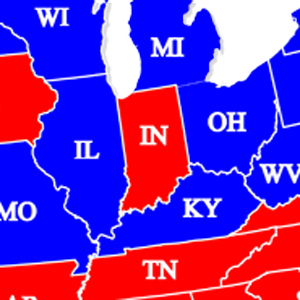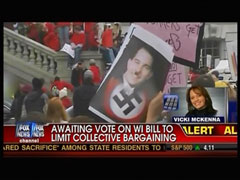Obama Justice & Labor Depts. NLRB Join Union Bosses, Support Backroom Union Deals in Federal Court
From the National Right to Work Legal Defense Foundation: Union officials ignore workers’ repeated requests to resign Hollywood, FL (April 19,…

From the National Right to Work Legal Defense Foundation: Union officials ignore workers’ repeated requests to resign Hollywood, FL (April 19,…

From the National Right to Work Legal Defense Foundation: Union officials ignore workers’ repeated requests to resign Hollywood, FL (April 19,…

New rules promulgated by the Obama’s National Labor Relations Board (NLRB) eviscerate employee privacy and leave employees vulnerable to union intimidation tactics at home as well as in the workplace. A vote is scheduled today on…

From FOX 59: Steel Dynamics, Inc. (NASDAQ: STLD), the nation’s fifth largest producer of carbon steel products, announced plans to expand its operations here, creating approximately 50 new jobs by 2013. Barry Schneider, vice president and general manager of…

Good economic news continues to flow from Wisconsin where Gov. Scott Walker's reforms are taking hold. The Wall Street Journal notes that by standing up to the union bosses, Walker was able to reduce the tax burden on home owners in Badger country: The public employee unions and other liberals are confident that Wisconsin voters will turn out Governor Scott Walker in a recall election later this year, but not so fast. That may turn out to be as wrong as some of their other predictions as Badger State taxpayers start to see tangible benefits from Mr. Walker's reforms—such as the first decline in statewide property taxes in a dozen years. On Monday Mr. Walker's office released new data that show the property tax bill for the median home fell by 0.4% in 2011, as reported by Wisconsin's municipalities. Property taxes, which are the state's largest revenue source and mainly fund K-12 schools, have risen every year since 1998—by 43% overall. The state budget office estimates that the typical homeowner's bill would be some $700 higher without Mr. Walker's collective-bargaining overhaul and budget cuts. The median home value did fall in 2011, by about 2.3%, which no doubt influenced the slight downward trend. But then values also fell in 2009 and 2010, by similar amounts, and the state's take from the average taxpayer still climbed by 2.1% and 1.5%, respectively. In absolute terms homeowners won't see large dollar benefits year over year, but any hold-the-line tax respite is both rare and welcome in this age of ever-expanding government.

Good economic news continues to flow from Wisconsin where Gov. Scott Walker's reforms are taking hold. The Wall Street Journal notes that by standing up to the union bosses, Walker was able to reduce the tax burden on home owners in Badger country: The public employee unions and other liberals are confident that Wisconsin voters will turn out Governor Scott Walker in a recall election later this year, but not so fast. That may turn out to be as wrong as some of their other predictions as Badger State taxpayers start to see tangible benefits from Mr. Walker's reforms—such as the first decline in statewide property taxes in a dozen years. On Monday Mr. Walker's office released new data that show the property tax bill for the median home fell by 0.4% in 2011, as reported by Wisconsin's municipalities. Property taxes, which are the state's largest revenue source and mainly fund K-12 schools, have risen every year since 1998—by 43% overall. The state budget office estimates that the typical homeowner's bill would be some $700 higher without Mr. Walker's collective-bargaining overhaul and budget cuts. The median home value did fall in 2011, by about 2.3%, which no doubt influenced the slight downward trend. But then values also fell in 2009 and 2010, by similar amounts, and the state's take from the average taxpayer still climbed by 2.1% and 1.5%, respectively. In absolute terms homeowners won't see large dollar benefits year over year, but any hold-the-line tax respite is both rare and welcome in this age of ever-expanding government.

From the "progressive" Washington Post's Charles Lane, an exposure of public sector unionism and its unequaled influence on elected officials and the cost of government: Of course, collective bargaining in the public sector is inherently contrary to majority rule. It transfers basic public-policy decisions — namely, the pay and working conditions that taxpayers will offer those who work for them — out of the public square and behind closed doors. Progressive Wisconsin has a robust “open meetings” law covering a wide range of government gatherings except — you guessed it — collective bargaining with municipal or state employees. So much for transparency. Even worse, to the extent that unions bankroll the campaigns of the officials with whom they will be negotiating — and they often do — they sit on both sides of the table. More from Lane: The furious drive to oust Walker is the sequel to last year’s dramatic battle over his plan to limit collective bargaining by public-sector unions. Walker won that fight, despite tumultuous pro-union demonstrations in and around the state capitol and a boycott of votes on the bill by the Democratic minority in the legislature.

From the "progressive" Washington Post's Charles Lane, an exposure of public sector unionism and its unequaled influence on elected officials and the cost of government: Of course, collective bargaining in the public sector is inherently contrary to majority rule. It transfers basic public-policy decisions — namely, the pay and working conditions that taxpayers will offer those who work for them — out of the public square and behind closed doors. Progressive Wisconsin has a robust “open meetings” law covering a wide range of government gatherings except — you guessed it — collective bargaining with municipal or state employees. So much for transparency. Even worse, to the extent that unions bankroll the campaigns of the officials with whom they will be negotiating — and they often do — they sit on both sides of the table. More from Lane: The furious drive to oust Walker is the sequel to last year’s dramatic battle over his plan to limit collective bargaining by public-sector unions. Walker won that fight, despite tumultuous pro-union demonstrations in and around the state capitol and a boycott of votes on the bill by the Democratic minority in the legislature.

Minnesota Judge Dale Lindman ruled that Gov. Mark Dayton's Executive Order (EO) calling for the unionization of child care providers is unconstitutional. Judge Lindman, an appointee of Gov. Arne Carlson, said that Gov. Dayton's EO is "an unconstitutional usurpation of the Legislature's right to create or amend laws", which "is a violation of the Separation of Powers principle." The Examiner called it s "stinging defeat for Gov. Dayton, AFSCME and the SEIU." Judge Lindman said that the BMS doesn't have statutory authority through Chapter 179 to get involved in this dispute, adding that they only have the authority to mediate in employer-employee disputes. HotAir.com weighs in on the news: Dayton attempted to bypass the state legislature in this effort by declaring through executive order that day-care centers that indirectly receive state aid through their clients are in effect public-sector workplaces — a definition not found in law or in legislative intent. In fact, as Gary Gross points out, it arguably contravenes state law. That way, Dayton could order an election that would allow his union allies to force their way into day-care workplaces, including many independent operations, and start extracting dues on a massive basis. I use the word extreme for a couple of reasons. First, it fits; had Dayton succeeded in his imposition of public-worker status, the precedent established would have been so broad as to threaten the very notion of a private-sector workforce altogether.